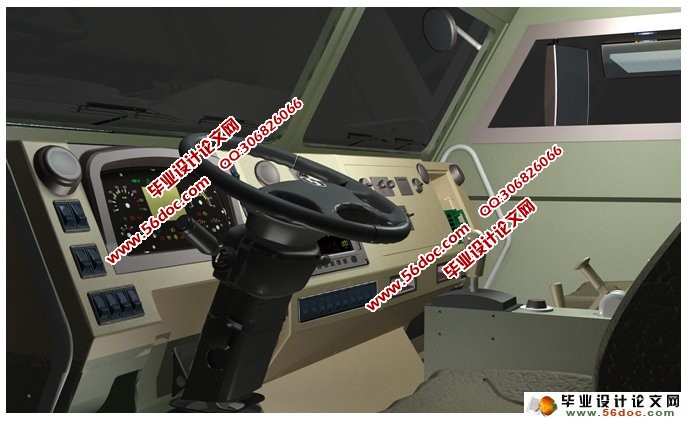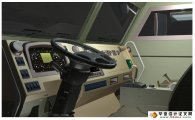基于人因可靠性分析方法的重型卡车优化设计方法研究(硕士)(论文45000字)
Research on Optimization Design Method for Cab of Heavy-duty Truck Based on Human Reliability Analysis
摘 要
重型卡车是中国汽车工业的重要组成部分,随着时代的进步,重型卡车将不再满足于粗放型设计,急需以人为本提高作业可靠性和使用价值,减少失误率和易发事故。论文主要针对以重型卡车驾驶室动态工作环境进行正常作业时进行人因可靠性分析。在重型卡车的作业过程中,驾驶员,驾驶室及驾驶室内环境组成了一个复杂的人-机-环系统。驾驶室是与人交互最为直接和频繁的空间,是整个人机系统的核心,人机系统可靠性在很大程度上取决于人的可靠性,因此,论文从人因可靠性的角度进行分析,对于不同的失效模式进行探讨,追溯其设计根原因并进行有针对性的优化设计,并提出基于人因可靠性分析的重型卡车驾驶室设计方法。对增强重型卡车人机适用性,实现人机功能匹配,最佳发挥驾驶员与驾驶室各自的优点,提高系统的可靠性都有很大的益处。因此,该论文的研究有很强的理论指导意义和实用价值。
首先,在参考国内外相关文献的基础上,研究了论文背景,研究目的和意义以及国内研究现状,并对其进行了详细总结分析。
其次,对论文的理论基础进行的详细分析。主要包括人因可靠性,人因可靠性分析方法,和重型卡车驾驶室设计原则三方面。人因可靠性包括人的行为研究、人误数据收集、人误识别、人误因子的分类、人的失误机理分析与建模、可靠性分析方法研究、减少人误的措施研究等方面。
再次,对重型卡车驾驶室设计的所有要素进行了研究分析,总结归纳重型卡车驾驶室的设计准则。把重型卡车驾驶室-人-环境看成一个人机系统,对他们各自的特点和需求进行了研究,并且分析其关系和彼此约束性。并且构建理论体系。
然后,提出基于人因可靠性分析方法的重型卡车驾驶室设计方法和设计流程,提出优化的人因可靠性分析方法对系统失误率进行预测,并提出假想CREAM追溯优化设计方法。
最后,用陕汽某重型卡车驾驶室优化设计为实例,对本文提出的基于人因可靠性分析的重型卡车驾驶室优化设计方法进行了眼动仪实验验证。
关键词:人因可靠性,CREAM,重型卡车,驾驶室设计,眼动仪实验
Abstract
Heavy-duty truck is an important part of Chinese auto industry. With the progress of time, heavy-duty truck will not satisfied with extensive design anymore. Improving the operational reliability to the truck which based on people oriented concept could makes its get promotion on the machine use value and productivity, and also could reduce the losses from misoperation accident. This paper researched on Human Reliability Analysis of dynamic work environment during normal operation which primarily to the heavy-duty truck driving cab. In the process of heavy-duty truck operation, driver, driving cab and indoor environment compose a complicated man-machine-environment system. Driving cab is the most direct and frequent space which interact with people, and it is also the core of the entire man-machine system. The reliability of man-machine system depends largely on the reliability of the people. Therefore, to improve the reliability of heavy-duty truck driving cab could improve the reliability of the heavy-duty truck operations fundamentally.
This paper analysis from the perspective of human-reliability, discuss the different failure patterns,trace its design root causes and target the optimization design, and present the design method of heavy-duty truck driving cab based on Human Reliability Analysis. It is both great benefit to enhance the man-machine applicability of heavy-duty truck, realize man-machine function matching, take each advantages of driver and driving cab in best way and improve the reliability of system. Therefore, the research of this paper has a strong theoretical guiding significance and practical value.
First of all, this paper research the thesis background, purpose, signification and domestic research status based on refer to the related literature of domestic and overseas. Then, make the summary analysis in detail on it.
Secondly, a detailed analyzing which mainly include human-reliability, analysis method of human-reliability and design principle of heavy-duty truck driving cab is presented on the paper’s theoretical basis. Human-Reliability including people's behavior research, data collection of people’s mistake, identification of people’s mistake, classification of people’s mistake factor, mechanism of people’s mistake analysis and modeling, reliability analysis method and measures studying to reduce the people’s mistake, etc.
Thirdly, this paper analysis all the elements of heavy-duty truck driving cab design, and sums up the principle of heavy-duty truck driving cab. Treating the driving cab-man-environment as a man-machine system, studied their respective characteristics and requirements, and analyzes the relations and the binding to each other. And then, build a theory system.
Then, the design method and process of heavy-duty truck driving cab based on Human Reliability Analysis and the forecast to the error rate of system by optimized method of Human Reliability Analysis is presented and hypothetical back CREAM optimization design method is put forward.
Finally, use the optimization design of heavy-duty truck driving cab in Shanxi Automobile Group Co., LTD as an example, verify the optimization design method of heavy-duty truck driving cab based on the Human Reliability Analysis which proposed in this paper by the eye tracker experiment.
Key words: human-reliability, CREAM, heavy-duty truck, design of driving cab,
eye tracker experiment

目 录
摘要 I
Abstract III
第一章绪论 1
1.1论文选题背景 1
1.2国内外研究现状 2
1.2.1人因可靠性研究现状 2
1.2.2人因失误机理及分类 3
1.3论文研究目的与意义 6
1.3.1研究目的 6
1.3.2研究意义 6
1.4论文研究内容与组织结构 6
第二章 基于人因可靠性分析方法的重型卡车驾驶室优化设计的理论基础 9
2.1人误 9
2.1.1人误基本概念 9
2.1.2系统中人误的特点 11
2.2人因可靠性 12
2.2.1人因可靠性概念 12
2.2.2人因可靠性分析特点 13
2.2.3人因可靠性在驾驶室设计中的应用 15
2.3人因可靠性分析方法 16
2.3.1人因可靠性分析方法汇总 16
2.3.2 CREAM分析法与CREAM追溯法 20
2.3.3假想CREAM追溯法 23
2.3.4人因可靠性分析方法比较标准及比较结果 24
2.4 以驾驶员人因可靠性为中心的重型卡车驾驶室工业设计要求 26
2.5 基于人因可靠性分析方法的重型卡车驾驶室优化设计的理论框架 26
第三章 重型卡车驾驶室设计要素分析 27
3.1产品概念讨论集的获取与预处理 28
3.1.1讨论集的获取 28
3.1.2讨论集的预处理 29
3.2基于Bootstrapping的产品概念特征提取 30
3.2.1种子特征选取 32
3.2.2文本模式抽取及评估 32
3.2.3候选产品概念特征提取 34
3.2.4更新产品概念特征种子集合 34
3.2.4产品概念特征过滤 34
3.3产品概念特征聚类 36
3.3.1模糊集合 36
3.3.2模糊均值聚类算法 36
3.4产品概念设计方案实现 38
3.4.1线上生成产品概念设计要求 38
3.4.2线下完成产品概念设计方案 39
第四章社区化网络协同产品概念设计评价与优化 41
4.1产品概念设计评价指标体系建立 41
4.2方案在线评价 44
4.1.1产品概念设计方案初步评价 44
4.1.2产品概念设计方案详细评价 45
4.3基于判断矩阵信息的多属性决策方法 45
4.3.1属性赋权 46
4.3.2 评价主体赋权 48
4.3.3 评价实施方法 49
4.4产品概念设计方案优化 50
第五章社区化网络协同产品概念设计平台实现与案例验证 51
5.1CNCPCDP平台实现 51
5.1.1平台流程 51
5.1.2平台的体系架构 52
5.1.3平台功能模块 53
5.2实例验证 56
5.2.1初始概念提交 56
5.2.2讨论集获取与预处理 57
5.2.3概念特征提取与聚类 59
5.2.4概念设计方案生成 59
5.2.5概念设计评价与优化 61
第六章结论 63
6.1主要研究工作与成果 63
6.2主要新见解 63
6.3尚待研究的问题 64
参考文献 65
|



